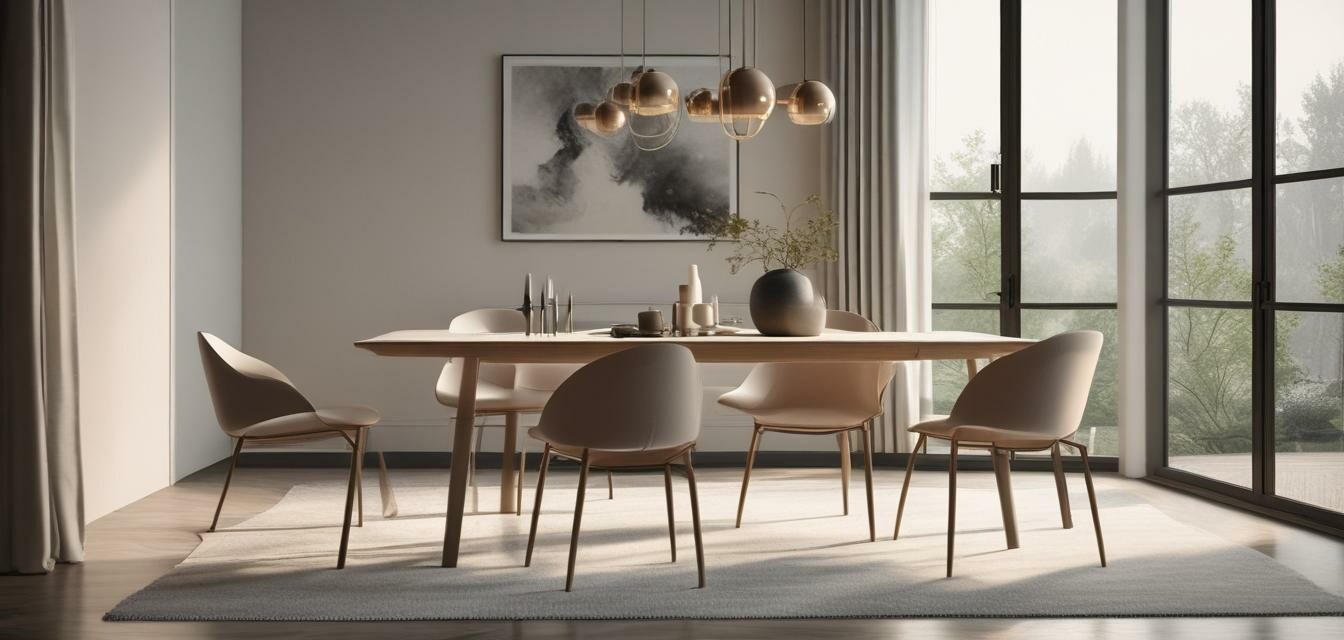
Minimalism in Dining: How to Achieve a Clean Look
- Prioritize essential furniture pieces for a clean dining space.
- Emphasize neutral colors to create a soothing ambiance.
- Focus on uncluttered designs and simple decor elements.
- Consider natural lighting to enhance the minimalistic feel.
In today's fast-paced world, minimalist design has become more than just a trend; it's a lifestyle choice. Embracing minimalism in your dining space can create an inviting atmosphere, allowing you to focus on what really matters: enjoying your meals with loved ones. This article will guide you through key principles and tips for achieving a clean look in your dining area.
The principles of minimalism
Minimalism is built on a few fundamental principles that aim to declutter and simplify living spaces. Here are some key elements:
- Functionality: Every piece of furniture should have a purpose.
- Simplicity: Strive for clean lines and simple shapes.
- Neutral color palette: Use whites, blacks, and greys for a cohesive look.
- Less is more: Opt for fewer items to create a greater impact.
Essential furniture pieces for a minimalist dining space
A minimalist dining area typically consists of essential furniture pieces that serve their purpose without overwhelming the space. Here are some recommendations:
| Furniture Item | Features | Material Suggestions |
|---|---|---|
| Dining Table | Simple design, often rectangular or round | Wood, glass, or metal |
| Dining Chairs | Functional with minimalistic shapes | Wood or upholstered in neutral fabric |
| Sideboard or Buffet | Used for storage, sleek lines | Wood or laminate |
Choosing a color palette
When adopting a minimalist approach in your dining space, selecting the right color palette is crucial. A neutral palette, focusing on whites, creams, and greys, can help create a serene environment. Here's how to effectively select your color scheme:
- Base Color: Choose a light base color for walls to reflect natural light.
- Accent Colors: Use one or two accent colors in decor pieces for a pop.
- Natural Materials: Incorporate wood and stone tones for warmth.
Decorating your minimalistic dining space
While minimalism encourages simplicity, it doesn't mean the absence of decor. Here are some suggestions for effective decorating:
- Use a single statement piece, such as artwork or a centerpiece.
- Incorporate plants for freshness and a touch of nature.
- Utilize functionality in decor, like stylish tableware.
Emphasizing natural light
One of the essential aspects of a minimalist dining area is to create a bright and inviting atmosphere. Natural light contributes significantly to this effect. Here are ways to maximize it:
- Window Treatments: Opt for sheer drapes or leave windows bare to allow more light in.
- Light Colors: Use light-colored furniture to reflect light.
- Mirrors: Place mirrors strategically to amplify natural light reflection.
Key challenges in minimalist design
While embracing minimalism can be rewarding, it comes with its own set of challenges. Some common hurdles include:
- Finding the right balance between minimalism and comfort.
- Avoiding a sterile look by using warm materials and textures.
- Overcoming the temptation to add too many decorative items.
Pros
- Creates a calming atmosphere for meals.
- Easier to clean and maintain a minimalist space.
- Encourages mindful eating by decreasing distractions.
Cons
- Can feel cold or uninviting if not styled correctly.
- Requires a conscious effort to avoid clutter.
Conclusion
Achieving a minimalist look in your dining space is all about focus and intentionality. By choosing essential furniture, a calming color palette, and strategic decor, you can enjoy a sleek dining experience that complements your lifestyle. Remember that the goal of minimalism is not just to declutter but to create a living space that reflects your personality while enhancing your everyday life.
For more tips on creating stylish dining areas, check out our other guides on Style Guides and explore the wide variety of Dining Room Sets available to you.


